Caramel corn is a popular crunchy snack loved by many, but have you ever wondered about its calorie content and nutritional value? In this article, I will delve into the mouthwatering world of caramel corn and provide you with the facts you need to make informed choices. Let’s satisfy our curiosity and uncover the sweet truth behind caramel corn calories, nutrition facts, and serving sizes.
- Understanding the calorie content of caramel corn can help with mindful snacking.
- Caramel corn nutrition facts include information about the fat, carbohydrate, and protein content.
- Knowing the recommended serving size of caramel corn promotes portion control.
- Caramel corn can have potential health benefits due to its fiber content and antioxidant properties.
- There are low-calorie options available for those watching their calorie intake.
Now that we are ready to dive into the world of caramel corn, let’s explore the calorie count and nutritional composition in the following sections.
How Many Calories in Caramel Corn?
Caramel corn may be sweet and tasty, but it’s important to understand how many calories it contains. Whether you’re enjoying it as a snack during movie nights or indulging in a handful as a delicious treat, being aware of the calorie content can help you make informed choices about your overall diet and calorie intake.
So, how many calories are in caramel corn? On average, a 1-ounce serving of caramel corn contains approximately 150-200 calories. However, it’s essential to note that the calorie count may vary slightly depending on the brand and recipe. If you’re watching your calorie intake, it’s advisable to check the nutrition facts label on the specific package you’re consuming to get an accurate estimate.
To put it into perspective, if you were to enjoy a standard 2-ounce serving of caramel corn, you would consume around 300-400 calories. While indulging every once in a while is perfectly fine, it’s crucial to practice portion control and be mindful of your overall calorie intake to maintain a balanced diet.
As with any food, moderation is key. While caramel corn can be an enjoyable treat, it’s always important to consider how it fits into your overall dietary goals and lifestyle. By being mindful of portion sizes and balancing it with other nutritious choices, you can savor the deliciousness of caramel corn while still maintaining a healthy and balanced diet.
Table: Calorie Content of Caramel Corn
| Brand | Serving Size (1 ounce) | Calories |
|---|---|---|
| Brand A | 1 ounce | 150 |
| Brand B | 1 ounce | 180 |
| Brand C | 1 ounce | 190 |
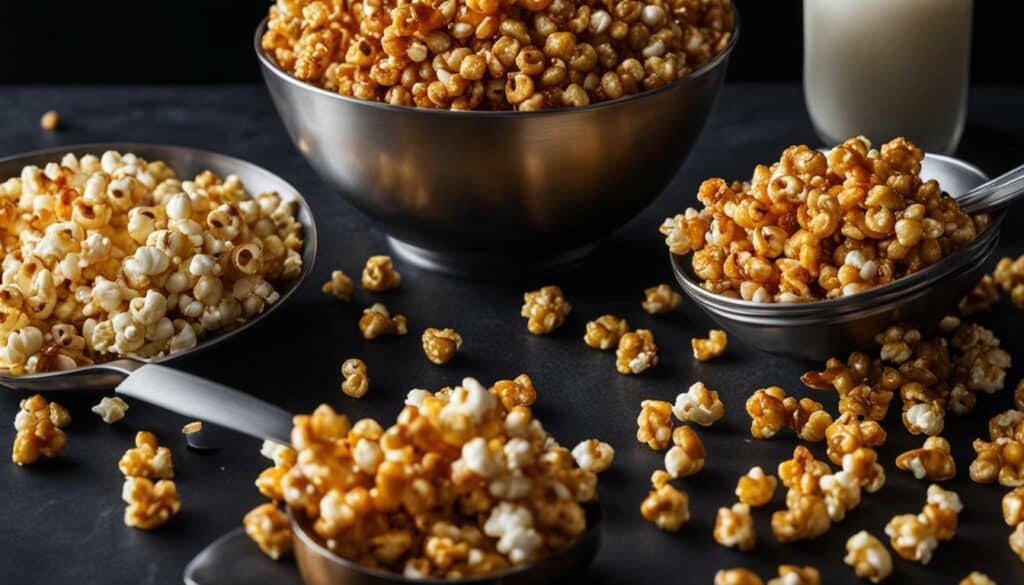
*Caramel corn image source: Unsplash.com*
To make informed choices about your snacks, let’s take a closer look at the nutrition facts of caramel corn. Caramel corn is a sweet and crunchy treat that combines the flavors of caramel and popcorn. It is often enjoyed during movie nights or as a tasty snack. While it may be tempting to indulge in this sugary delight, it’s important to be aware of its nutritional composition and how it fits into your overall diet.
“Caramel corn is a delicious treat that can be enjoyed in moderation. Understanding its nutrition facts can help you make informed choices about incorporating it into your diet.”
When it comes to the nutritional value of caramel corn, it’s essential to consider both the pros and cons. On the positive side, caramel corn contains some beneficial nutrients. It offers a small amount of dietary fiber and protein, which contribute to a feeling of fullness and help support overall health. However, it’s important to note that caramel corn is also relatively high in calories, sugar, and fat, which can have negative effects on your health if consumed in excess.
To illustrate the nutritional content of caramel corn, let’s take a closer look at the following table:
| Nutrient | Amount per serving (1 cup) |
|---|---|
| Calories | 150 |
| Total Fat | 6g |
| Saturated Fat | 1g |
| Trans Fat | 0g |
| Cholesterol | 0mg |
| Sodium | 150mg |
| Total Carbohydrate | 24g |
| Dietary Fiber | 1g |
| Total Sugars | 12g |
| Protein | 2g |
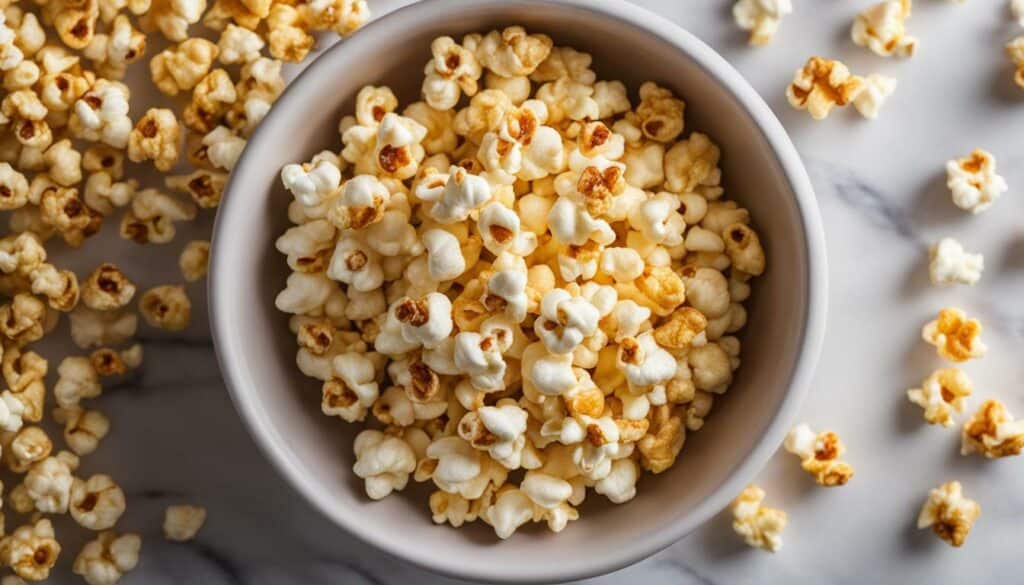
As shown in the table above, a serving of caramel corn (approximately 1 cup) contains 150 calories, 6g of total fat, 24g of carbohydrates, 12g of sugar, and 2g of protein. It’s important to keep in mind that portion sizes can vary, so always check the nutrition label on the specific brand or homemade caramel corn you are consuming.
Incorporating Caramel Corn Into a Balanced Diet
While caramel corn can be enjoyed as an occasional treat, it’s essential to consume it in moderation and balance it with other nutritious foods. Consider incorporating caramel corn into a well-rounded diet that includes plenty of fruits, vegetables, whole grains, and lean proteins to ensure you’re getting a wide range of essential nutrients.
Ultimately, understanding the nutrition facts of caramel corn empowers you to make educated choices about what snacks to include in your diet. By being mindful of portion sizes and balancing your overall nutritional intake, you can enjoy the deliciousness of caramel corn while maintaining a healthy lifestyle.
Recommended Caramel Corn Serving Size
Finding the right serving size for caramel corn can help you enjoy this treat without overindulging. It’s important to strike a balance between savoring the delicious flavors of caramel-coated popcorn and being mindful of portion control. By understanding the recommended serving size, you can indulge in caramel corn guilt-free.
According to nutrition experts, a typical serving size of caramel corn is about 1 ounce or 28 grams. This is equivalent to roughly 3 cups of caramel corn. However, it’s easy to underestimate how much we consume, especially when snacking on this addictive treat. To ensure you’re not going overboard, it can be helpful to measure out the recommended portion and enjoy it mindfully.
Tips for Portion Control:
- Measure out your serving size: Use a kitchen scale or measuring cups to accurately portion out 1 ounce or 3 cups of caramel corn.
- Eat slowly and savor each bite: By taking your time to enjoy the flavors and textures of caramel corn, you’ll feel more satisfied and less tempted to reach for more.
- Practice mindful snacking: Avoid mindlessly munching on caramel corn while watching TV or working. Instead, allocate a designated snack time and fully focus on the enjoyment of your treat.
- Pair with a protein source: Combining your caramel corn with a protein-rich food, such as a handful of almonds or a glass of milk, can help keep you fuller for longer.
Remember, moderation is key when it comes to enjoying caramel corn. While it may be tempting to devour the entire bag in one sitting, being mindful of your serving size will allow you to savor the flavors guilt-free. By practicing portion control, you can indulge in this sweet treat without compromising your health and dietary goals.
| Serving Size | Calories | Total Fat (g) | Carbohydrates (g) | Protein (g) |
|---|---|---|---|---|
| 1 ounce (28 grams) | 120 | 5 | 19 | 1 |
Table: Nutrition Facts for 1 ounce (28 grams) of Caramel Corn
Health Benefits of Caramel Corn
While caramel corn is undoubtedly delicious, it may also offer some surprising health benefits. This irresistible sweet treat can provide a boost of energy and satisfy your cravings, making it a popular choice for movie nights, parties, and indulgent snacking. But did you know that caramel corn can also have positive effects on your overall well-being?
Caramel corn is made from popcorn, which is a whole grain and a good source of fiber. Fiber plays a crucial role in digestive health, helping to regulate bowel movements and prevent constipation. Additionally, popcorn contains polyphenols, which are antioxidants that can help protect your body against oxidative stress and inflammation.
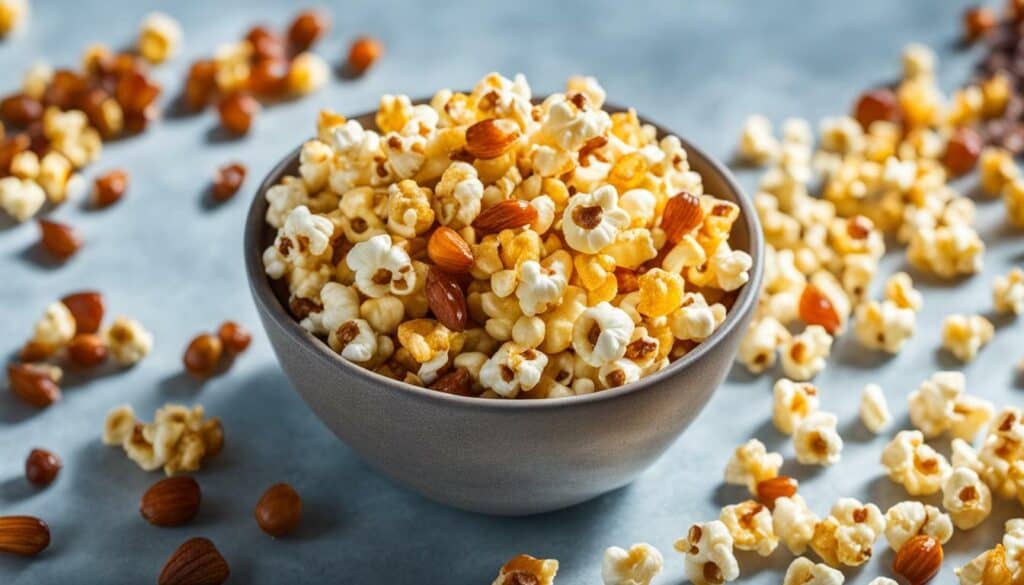
In addition to its fiber and antioxidant content, caramel corn can also provide a mood-boosting effect. The carbohydrates in caramel corn can increase the production of serotonin, a neurotransmitter that contributes to feelings of happiness and well-being. This is why many people turn to comfort foods like caramel corn when they are feeling down or stressed.
| Nutrient | Amount per Serving |
|---|---|
| Calories | 120 |
| Total Fat | 4g |
| Carbohydrates | 20g |
| Protein | 1g |
“I love indulging in some caramel corn when I need a pick-me-up. The combination of sweetness and crunch always puts a smile on my face!” – Jane, caramel corn enthusiast
Gut Health and Caramel Corn
Another benefit of caramel corn lies in its potential to support gut health. The whole grains in popcorn provide prebiotics, which are fibers that nourish the beneficial bacteria in your gut. A healthy gut microbiome is essential for digestion, nutrient absorption, and maintaining a strong immune system.
In conclusion, while caramel corn should be enjoyed in moderation due to its calorie content, it can still be enjoyed as part of a balanced diet. Its health benefits, such as fiber content, antioxidant properties, and potential mood-boosting effects, make it a tasty and beneficial snack option. Just remember to savor it mindfully and strike a balance with other nutritious foods!
Low Calorie Caramel Corn Options
If you’re looking for a lower calorie alternative to traditional caramel corn, there are options available. These options allow you to satisfy your sweet tooth while being mindful of your calorie intake. Whether you’re trying to lose weight or simply maintain a healthy lifestyle, these alternatives can be a great addition to your snacking repertoire.
One option is to make your own low calorie caramel corn at home. By using healthier ingredients and reducing the amount of sugar and butter, you can enjoy a guilt-free snack. Opt for air-popped popcorn instead of the traditional oil-popped version to keep the calorie count low. Substitute natural sweeteners like honey or maple syrup for refined sugar, and use a small amount of heart-healthy oil instead of butter. This homemade version allows you to control the ingredients and customize the flavor to your liking.
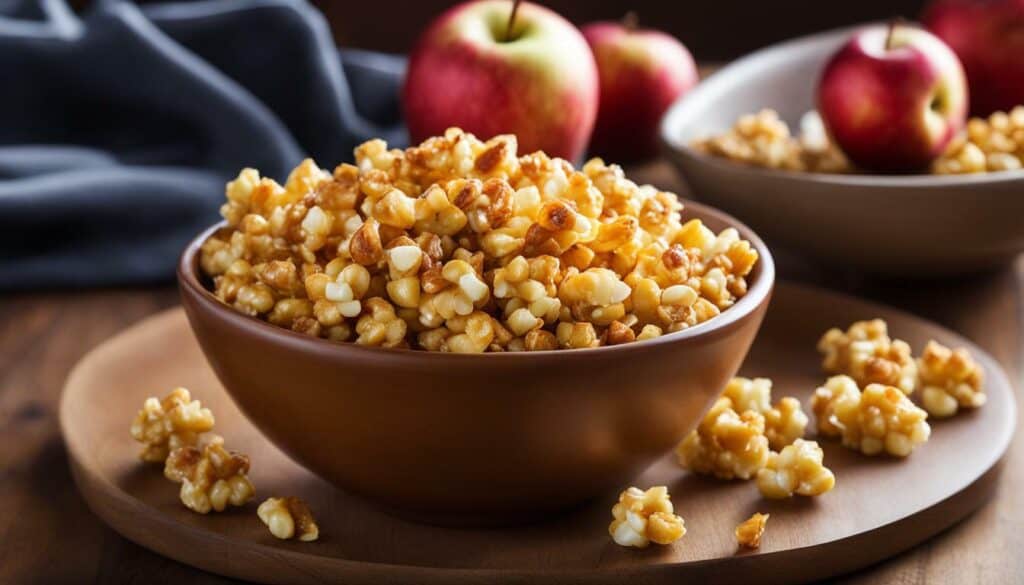
Another option is to explore low calorie pre-packaged caramel corn brands available in the market. Many manufacturers now offer healthier alternatives that are lower in calories and fat. These options often use natural sweeteners and whole grains, making them a nutritious choice. Remember to check the nutrition labels for serving sizes and calorie content, as well as the ingredient list to ensure you are making a smart choice.
When it comes to snacking, portion control is key. Even with low calorie options, it’s important to enjoy caramel corn in moderation. Keep in mind that excessive consumption can still contribute to weight gain and other health issues. It’s always a good idea to practice mindful eating and listen to your body’s hunger cues.
The Benefits of Low Calorie Caramel Corn
Aside from being a tasty treat, low calorie caramel corn can offer several benefits. When consumed in moderation, it can be a satisfying snack without derailing your diet. It provides a good source of whole grains and fiber, which can support digestion and help maintain regularity. Additionally, it offers a crunchy texture that can help satisfy cravings and prevent mindless snacking on less healthy options.
In conclusion, low calorie caramel corn options are a great way to enjoy this classic snack without the guilt. By making your own homemade version or choosing pre-packaged brands with healthier ingredients, you can indulge in the sweet and crunchy goodness without compromising your calorie goals. Remember to enjoy caramel corn in moderation and listen to your body’s cues for hunger and satisfaction. With these alternatives, you can still satisfy your cravings while staying on track with your health and wellness goals.
The Importance of Caramel Corn Portion Control
Portion control plays a vital role in ensuring you can enjoy caramel corn as part of a balanced diet. While this tasty treat can be a delightful indulgence, it’s essential to be mindful of your serving size to prevent overconsumption of calories and sugar. By practicing portion control, you can savor the sweet delight of caramel corn while still maintaining a healthy lifestyle.
One effective way to manage your portion sizes is by measuring your caramel corn servings. Use a measuring cup or kitchen scale to accurately portion out your desired amount. This method allows you to enjoy the delicious taste without going overboard on the calorie count.
Another helpful strategy is to divide your caramel corn into individual snack bags or containers. By pre-portioning your servings, you can easily grab a ready-to-eat snack without the risk of mindlessly devouring the entire bag. This simple step can help you make mindful choices and maintain control over your consumption.
| Caramel Corn Portion Control Tips |
|---|
| Measure servings using a measuring cup or scale |
| Divide caramel corn into individual snack bags |
| Practice mindful eating – savor each bite |
| Avoid eating straight from the bag or container |
| Listen to your body’s hunger and fullness cues |
Remember, portion control doesn’t mean depriving yourself of the things you enjoy. It’s about finding a balance and being aware of your consumption. By incorporating caramel corn into your diet in moderation and being mindful of your portions, you can savor the sweetness while still maintaining a healthy lifestyle.
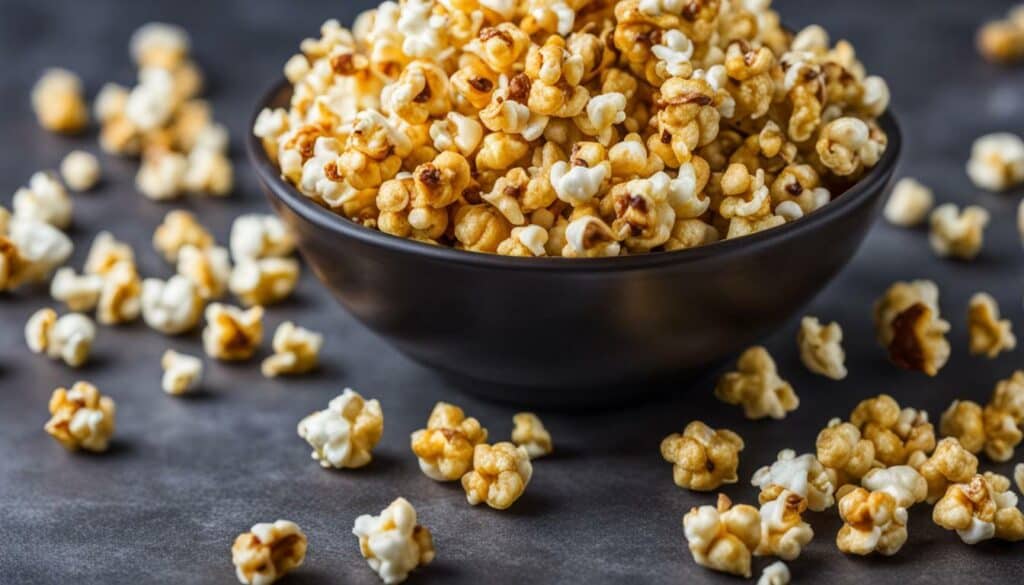
When enjoying caramel corn, take the time to truly savor each bite. Engage your senses and appreciate the aroma, texture, and taste of this delectable treat. By eating mindfully, you can fully enjoy the experience of indulging in caramel corn while also staying in tune with your body’s hunger and fullness cues. Remember, it’s not just about the food itself, but also the enjoyment and satisfaction it brings.
So, next time you reach for a bag of caramel corn, remember the importance of portion control. By practicing mindful eating and being conscious of your servings, you can relish each mouthful while still maintaining a healthy and balanced diet.
Other Factors to Consider
While calories and nutritional value are important, there are other factors to keep in mind when analyzing caramel corn’s impact on your diet. One significant consideration is the calorie content of caramel corn. Although it may be tempting to indulge in a large serving, consuming excessive calories can lead to weight gain and negatively affect your overall health.
Additionally, understanding the nutritional value of caramel corn is essential. While it may provide a delicious treat, it often lacks significant amounts of essential nutrients. Caramel corn is typically high in sugar and low in fiber, which can cause spikes in blood sugar levels and leave you feeling unsatisfied.
Another factor to consider is the potential impact of caramel corn on your mood. Consuming large amounts of sugar can lead to temporary feelings of euphoria, followed by a crash that can leave you feeling irritable and fatigued. It’s important to be mindful of your sugar intake and seek healthier alternatives to satisfy your sweet cravings.
The Connection Between Diet and Mood
It’s important to note that the food we consume can have a significant impact on our mood and mental wellbeing. Studies have shown that diets high in sugar and processed foods are associated with an increased risk of depression and anxiety. On the other hand, diets rich in fruits, vegetables, whole grains, and lean proteins have been linked to improved mental health.
One way to understand the relationship between food and mood is by keeping a food/mood journal. By recording what you eat and how you feel afterwards, you can identify patterns and make informed decisions about your diet. This practice can empower you to make healthier choices and achieve a better balance between enjoying treats like caramel corn and maintaining a nutritious diet.
| Factors to Consider | Impact on Diet |
|---|---|
| Calorie Content | Excessive calorie intake can lead to weight gain and health issues |
| Nutritional Value | Caramel corn may lack essential nutrients and be high in sugar |
| Mood Impact | Sugar crashes can lead to irritability and fatigue |
| Diet and Mood Connection | Diets high in sugar increase the risk of depression and anxiety |
In conclusion, while considering the calorie content and nutritional value of caramel corn is crucial, it’s important to remember that there are other factors to keep in mind when evaluating its impact on your diet. Being mindful of your sugar intake, understanding the connection between food and mood, and maintaining a balanced diet can help you make informed choices and support your overall well-being.
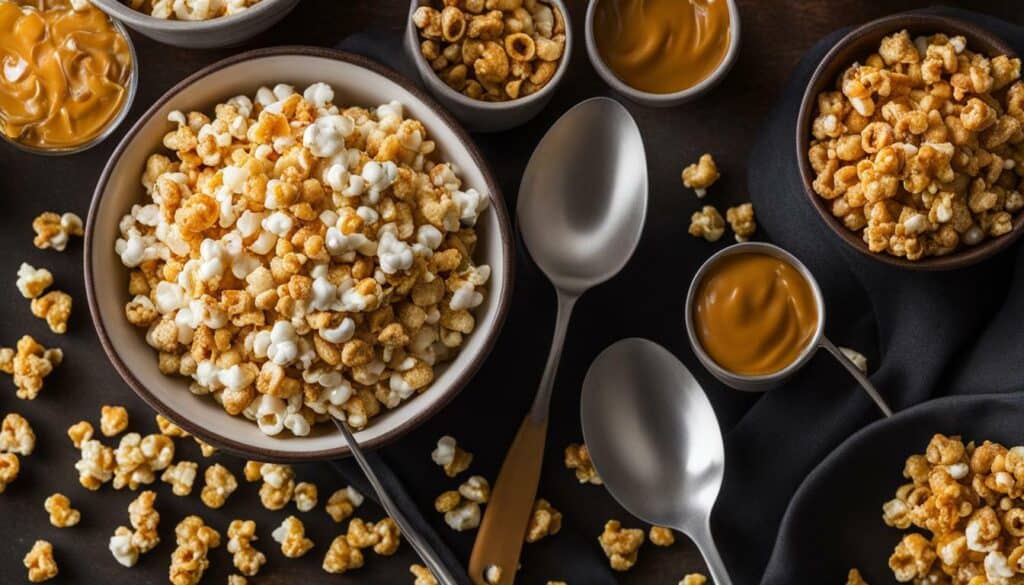
Caramel corn can be enjoyed as a treat, but it’s essential to be mindful of its calorie content and practice portion control for a balanced snacking experience.
As we’ve explored in this article, caramel corn is a delicious snack that can satisfy your sweet tooth. However, it’s important to remember that indulging in this delectable treat should be done in moderation. With an average calorie count of around 140 calories per ounce, caramel corn can quickly add up if consumed in large quantities.
Additionally, portion control plays a significant role in maintaining a balanced diet. It’s easy to mindlessly munch on caramel corn, especially when the bowl is within arm’s reach. But by practicing portion control and being aware of your snacking habits, you can enjoy caramel corn without derailing your health goals.
While caramel corn may not be the healthiest snack choice, it’s okay to indulge occasionally. However, if you’re looking for a healthier alternative, consider low-calorie options or homemade versions that allow you to control the ingredients and portion size.
Remember, maintaining a healthy diet is about finding the right balance. Caramel corn can be a part of your snacking repertoire, but it’s essential to prioritize nutrient-dense foods, listen to your body’s cues, and practice mindful eating. As with any food, keeping a food/mood journal can help you identify any potential connections between what you eat and how you feel, further supporting your overall well-being.
FAQ
Q: How many calories are in caramel corn?
A: The calorie content of caramel corn can vary depending on the brand and recipe. On average, a 1-ounce serving of caramel corn contains around 130-150 calories.
Q: What are the nutritional facts of caramel corn?
A: Caramel corn typically contains a mix of carbohydrates, fats, and sugars. A serving may have around 5-6 grams of fat, 20-25 grams of carbohydrates, and 10-15 grams of sugar.
Q: What is the recommended serving size for caramel corn?
A: The ideal serving size for caramel corn is about 1 ounce or 28 grams. It’s important to practice portion control to avoid overconsumption.
Q: Are there any health benefits to eating caramel corn?
A: Caramel corn can provide some health benefits when consumed in moderation. It contains fiber, which aids digestion, and certain antioxidants that have potential health benefits.
Q: Are there low-calorie options available for caramel corn?
A: Yes, there are low-calorie options for caramel corn available in the market. These options often use alternative sweeteners or reduce the amount of sugar to provide a healthier snack choice.
Q: Why is portion control important when eating caramel corn?
A: Portion control is crucial when enjoying caramel corn to manage calorie intake. Overeating may lead to consuming excess calories, which can contribute to weight gain and affect overall health.
Q: What other factors should I consider when evaluating the healthiness of caramel corn?
A: Apart from the calorie content, it’s essential to look at the nutritional value of caramel corn. Consider the sugar and sodium content, as excessive intake of these can have negative effects on health.
How Many Calories are in Caramel Corn Compared to Regular Caramel?
Caramel corn contains more calories than regular caramel. While regular caramel is rich and sweet, caramel corn is a combination of caramelized sugar and popcorn, resulting in a snack that is not only delicious but also higher in calories. It’s important to be mindful of the calories in caramel corn if you’re watching your intake.

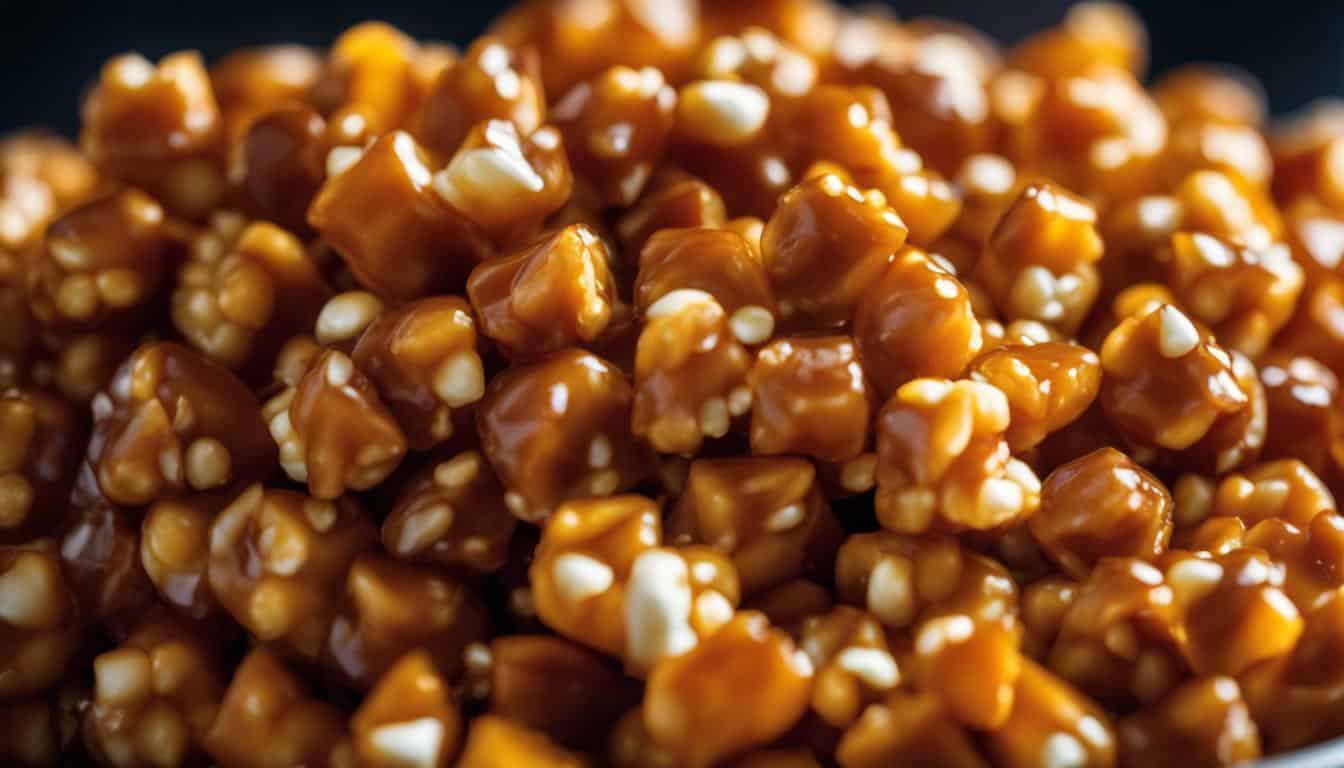



Leave a Reply